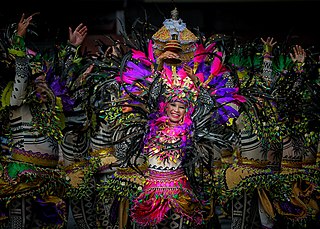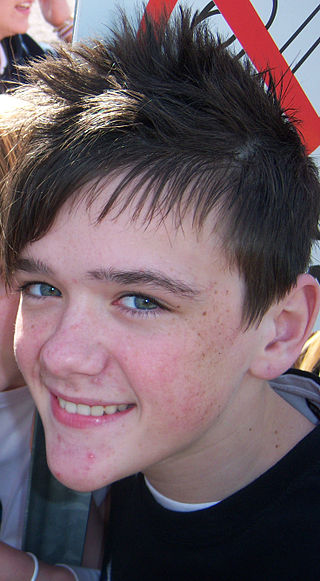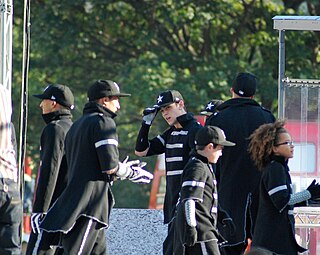
Contact juggling is a form of object manipulation that focuses on the movement of objects such as balls in contact with the body. Although often used in conjunction with "toss juggling", it differs in that it involves the rolling of one or more objects without releasing them into the air.

Flashdance is a 1983 American romantic drama dance film directed by Adrian Lyne and starring Jennifer Beals as a passionate young dancer who aspires to become a professional ballerina (Alex), alongside Michael Nouri playing her boyfriend and the owner of the steel mill where she works by day in Pittsburgh. It was the first collaboration of producers Don Simpson and Jerry Bruckheimer, and the presentation of some sequences in the style of music videos was an influence on other 1980s films including Footloose, Purple Rain, and Top Gun, Simpson and Bruckheimer's most famous production. It was also one of Lyne's first major film releases, building on television commercials. Alex's elaborate dance sequences were shot using body doubles.

Street dance is an umbrella term for a large number of social dance styles such as: breakdancing, popping, locking, house dance, waacking, voguing etc. Social dance styles have many accompanying steps and foundations, created organically from a culture, a moment in time, a way of life, influenced by natural social interaction. A street dance is a vernacular dance in an urban context. Vernacular dances are often improvisational and social in nature, encouraging interaction and contact with spectators and other dancers. These dances are a part of the vernacular culture of the geographical area that they come from.

The Sinulog-Santo Niño Festival is an annual cultural and religious festival held on the third Sunday of January in Cebu City and is the centre of the Santo Niño Catholic Christian celebrations in the Philippines.

A block party or street party is a party in which many members of a single community congregate, either to observe an event of some importance or simply for mutual solidarity and enjoyment. The name comes from the form of the party, which often involves closing an entire city block to vehicle traffic or just a single street. Many times, there will be a celebration in the form of playing music, games, dance and activities with food such as popcorn machines and barbecues.

You Got Served is a 2004 American dance drama film written and directed by Chris Stokes, who was also the business manager of the performers who were the film's main characters: recording artist Marques Houston and the boy band B2K. The plot follows a group of dancers who take part in a street dancing competition. You Got Served was produced by Marcus Morton, Cassius Vernon Weathersby, Billy Pollina, and Kris Cruz Toledo, and filming took place Between May 1, 2003, and June 25, 2003. The Columbia Pictures division Screen Gems released the film on January 30, 2004—the weekend of Super Bowl XXXVIII. It opened at #1 at the box office during its opening weekend, and grossed $16 million in its first week.

"Dancing in the Street" is a song written by Marvin Gaye, William "Mickey" Stevenson and Ivy Jo Hunter. It first became popular in 1964 when recorded by Martha and the Vandellas whose version reached No. 2 on the Billboard Hot 100 chart and peaked at No. 4 in the UK Singles Chart. It is one of Motown's signature songs and is the group's premier signature song. A 1966 cover by the Mamas & the Papas was a minor hit on the Hot 100 reaching No. 73. In 1982, the rock group Van Halen took their cover of "Dancing in the Street" to No. 38 on the Hot 100 chart and No. 15 in Canada on the RPM chart. A 1985 duet cover by David Bowie and Mick Jagger charted at No. 1 in the UK and reached No. 7 in the US. The song has been covered by many other artists, including The Kinks, Tages, Black Oak Arkansas, Grateful Dead, Little Richard, Myra and Karen Carpenter.

Hip hop dance is a range of street dance styles primarily performed to hip hop music or that have evolved as part of hip hop culture. It is influenced by a wide range of styles that were created in the 1970s and made popular by dance crews in the United States. The television show Soul Train and the 1980s films Breakin', Beat Street, and Wild Style showcased these crews and dance styles in their early stages; therefore, giving hip-hop dance mainstream exposure.

Breaking, also called breakdancing or b-boying/b-girling, is an athletic style of street dance that originated from African American communities in the United States. While diverse in the amount of variation available in the dance, breakdancing mainly consists of four kinds of movement: toprock, downrock, power moves and freezes. Breakdancing is typically set to songs containing drum breaks, especially in hip-hop, funk, soul music and breakbeat music, although modern trends allow for much wider varieties of music along certain ranges of tempo and beat patterns.

The Valencia Street Circuit was a street circuit in Valencia, Spain which hosted the Formula One European Grand Prix for five years (2008–2012). The first race meeting on the circuit was held over the 23/24 August 2008 weekend, with Felipe Massa winning the main event, the European Grand Prix, after starting from pole position. The circuit used the roads skirting the city's harbour and America's Cup port area – including a section over a 140-metre-long (460 ft) swing bridge – and also included some roads designed exclusively for racing purposes by the German architect Hermann Tilke, who also designed the infrastructure buildings for the circuit. The 2012 edition took place on 24 June and was the last to go under the name of the European Grand Prix until 2016, when the Baku City Circuit used the title for one year. The circuit has been left abandoned after a deal fell through to alternate this venue with Catalunya in Barcelona to host the Spanish Grand Prix.

Step Up 2: The Streets is a 2008 American dance drama film directed by Jon M. Chu and written by Toni Ann Johnson and Karen Barna. It serves as a sequel to 2006's Step Up and the second installment in the Step Up film series. The film stars Briana Evigan, Robert Hoffman, Will Kemp, and Cassie Ventura.

George William Sampson is an English street dancer, television presenter, singer, and actor. He won the second series of Britain's Got Talent on 31 May 2008 at the age of 14. He is an official ambassador of the United Dance Organisation.

Diversity are a British street dance troupe formed in 2007 and based in London. They are best known for winning the third series of Britain's Got Talent in 2009, beating Susan Boyle in the live final.

Flawless are an English street dance troupe based in the UK who competed on the third series of Britain's Got Talent in 2009. Flawless made the final of the competition, appearing alongside fellow street dance troupe Diversity.

"Turn Up the Music" is a song by American singer Chris Brown. It was written by Alexander "Fuego" Palmer, Brown, Damon Thomas, Harvey Mason Jr., Michael "Mike J" Jimenez, Terence Coles and Agent X, while production was handled by Fuego and The Underdogs. "Turn Up the Music" was sent to contemporary hit radio playlists in the United States on February 7, 2012, as the lead single from Brown's fifth studio album Fortune (2012). It was released for digital download on February 10, 2012. "Turn Up the Music" is an uptempo song which draws from the genres of electronic dance and house. Instrumentation consists of pulsating beats, synthesizers, a "throbbing bass" and percussion. According to Mason Jr., the song's inspiration came from visualizing Brown as an artist, "how he dances and how he performs, and giving him something to match that energy."

"Turn Up the Radio" is a song recorded by American recording artist Madonna for her twelfth studio album, MDNA (2012). It was written by Madonna, Martin Solveig, Michael Tordjman and Jade Williams, and produced by Madonna and Solveig. The song was released as the fourth and final single from the album on June 29, 2012. The single was also released as a digital EP, and included a remix featuring the group Far East Movement. "Turn Up the Radio" is a dance-pop, electropop and Euro house song with a French house-inspired chorus.

Nora Fatehi is a Canadian dancer and actress based in India. She has appeared in Hindi, Telugu, Tamil and Malayalam films. Fatehi made her acting debut with the Hindi film Roar: Tigers of the Sundarbans.

Three Sisters Tavern, sometimes abridged as Three Sisters and nicknamed "Six Tits", was a gay bar and strip club in Portland, Oregon, United States. The bar was founded in 1964 and began catering to Portland's gay community in 1997 following the deaths of the original owners. The business evolved into a strip club featuring an all-male revue. Also frequented by women, sometimes for bachelorette parties, Three Sisters was considered a hub of Portland's nightlife before closing in 2004.

Street Dance Girls Fighter is a spin-off of South Korean dance survival program Street Woman Fighter that premiered on Mnet on November 30, 2021 and aired every Tuesday at 22:20 KST. Female dance crews composed of high school-aged girls compete to become the top teenage dance crew. The winning crew receives a ₩10,000,000 scholarship, an opportunity to serve as an advertising model for financial services for teens, and the Street Dance Girls Fighter Trophy.


















